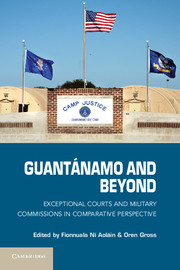Book contents
- Frontmatter
- Contents
- Contributors
- Acknowledgments
- Introduction: Guantánamo and Beyond
- Part I Military Commissions and Exceptional Courts in the United States
- 1 The Development of an Exceptional Court
- 2 Military Commissions in Historical Perspective
- 3 Contemporary Law of War and Military Commissions
- 4 Military Commissions and the Paradigm of Prevention
- 5 Prevention, Detention, and Extraordinariness
- 6 In Defense of Federal Criminal Courts for Terrorism Cases in the United States
- 7 Exceptional Courts and the Structure of American Military Justice
- 8 Exceptional Courts in Counterterrorism
- Part II Exceptional Courts and Military Commissions Elsewhere
- Part III International Law, Exceptional Courts, and Military Commissions
- Index
- References
4 - Military Commissions and the Paradigm of Prevention
Published online by Cambridge University Press: 05 June 2014
- Frontmatter
- Contents
- Contributors
- Acknowledgments
- Introduction: Guantánamo and Beyond
- Part I Military Commissions and Exceptional Courts in the United States
- 1 The Development of an Exceptional Court
- 2 Military Commissions in Historical Perspective
- 3 Contemporary Law of War and Military Commissions
- 4 Military Commissions and the Paradigm of Prevention
- 5 Prevention, Detention, and Extraordinariness
- 6 In Defense of Federal Criminal Courts for Terrorism Cases in the United States
- 7 Exceptional Courts and the Structure of American Military Justice
- 8 Exceptional Courts in Counterterrorism
- Part II Exceptional Courts and Military Commissions Elsewhere
- Part III International Law, Exceptional Courts, and Military Commissions
- Index
- References
Summary
WHY MILITARY COMMISSIONS? THAT IS THE CENTRAL question posed by President George W. Bush's decision to create the commissions in the first place, Congress's to authorize them twice in statutes enacted in 2006 and 2009, and President Barack Obama's to continue their use under his administration, notwithstanding his criticisms of them as a candidate. There is, no doubt, historical precedent for military commissions – but for the most part, that historical precedent involved materially different situations, in which military commissions were a matter of necessity, not discretion. Military commissions were employed, for example, where the military had ousted the existing government, and had to provide some venue for the enforcement of law as an occupying force. Moreover, their procedures have generally conformed to those of courts-martial. In the current circumstances, by contrast, there seems to be little or no necessity for military commissions. Most of the conduct charged and tried as war crimes in military commissions could be charged and tried in civilian criminal courts, under ordinary terrorism laws. If it is thought that a military court is particularly appropriate for the trial of war crimes, the preexisting and established system of courts-martial could have been employed.
Both the civilian criminal court and the court-martial are preferable venues for many reasons. They both have established track records. The United States has a robust civilian criminal justice system, in which many individuals have been tried successfully for terrorist crimes, both before and after September 11, 2001. The United States has an equally strong court-martial system, with rules of evidence that largely track those of civilian criminal courts, and in which thousands of criminal trials have been successfully conducted. The rules governing civilian criminal proceedings and courts-martial are clear, well settled, and have been subjected to and survived repeated constitutional testing. The judges are experienced in conducting trials. There is substantial precedent to guide their decisions, which decreases the likelihood of erroneous or arbitrary decision making, and in turn reduces the likelihood of long and costly appeals and retrials.
- Type
- Chapter
- Information
- Guantánamo and BeyondExceptional Courts and Military Commissions in Comparative Perspective, pp. 95 - 116Publisher: Cambridge University PressPrint publication year: 2013



